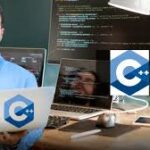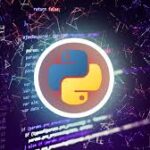LEARN C , C++ , C# , JAVA : ULTIMATE COURSE FOR BEGINNERS
Summary
The “C, C++, C#, Java: Ultimate Course for Beginners” is a comprehensive educational guide designed to introduce learners to four of the most popular and widely used programming languages in the world: C, C++, C#, and Java. The course is aimed at absolute beginners with basic computer knowledge who are eager to dive into the world of software development. It offers a beginner-friendly approach to mastering foundational programming concepts in these languages, which are essential for many fields in software engineering, game development, application design, and more.
Course Overview
The course is structured to help learners build a strong foundation in programming through easy-to-follow, step-by-step tutorials. It begins with the basics of each language, progressing to more advanced concepts, ensuring that students can grasp the core ideas before moving on. The course emphasizes practical, real-world applications, allowing learners to gain hands-on experience with coding examples that mirror the challenges developers face in their daily work.
By the end of the course, students will have a solid understanding of the syntax, structure, and control flow of C, C++, C#, and Java. They will also gain insights into the object-oriented programming (OOP) paradigm and learn how to write programs that utilize core programming principles.
Detailed Breakdown of the Languages Covered
- C Programming:
- The course starts by covering the essentials of C programming, one of the oldest and most foundational programming languages. C is a procedural language that emphasizes direct control over system resources and memory management. It is widely used in embedded systems, operating systems, and performance-critical applications.
- Key concepts introduced include:
- Syntax and structure: Learn how to write basic programs, declare variables, and understand data types.
- Control flow: Understand loops (for, while), conditionals (if, else), and functions to control program execution.
- Memory management: Learn how pointers work and how to allocate and deallocate memory dynamically.
- C++ Programming:
- Building on the foundation of C, the course transitions into C++, which is an extension of C that introduces object-oriented programming (OOP) principles.
- Key topics include:
- Object-Oriented Programming: Grasp the concept of classes, objects, inheritance, polymorphism, and encapsulation.
- Advanced features: Learn about templates, exception handling, and the Standard Template Library (STL).
- Syntax and structure: While much of the syntax is similar to C, students will explore how C++ builds on this to introduce more abstract and flexible code structures.
- Control flow and memory management: As in C, learners will cover control structures and dynamic memory management but with enhanced capabilities through object-oriented features.
- C# Programming:
- The course then moves on to C# (C-Sharp), a modern, object-oriented programming language developed by Microsoft. It is widely used for Windows applications, game development (via Unity), and web services (via ASP.NET).
- C# emphasizes developer productivity and simplicity, combining the power of C++ with ease of use and a rich ecosystem.
- Key concepts include:
- Object-oriented programming: Classes, objects, methods, properties, and inheritance.
- Language features: Learn about automatic memory management through garbage collection, asynchronous programming, and strong type-checking.
- Control flow: Study how loops, conditionals, and error handling work in C#.
- Windows applications: Understand how C# is used to develop desktop applications with graphical user interfaces (GUIs) using the .NET framework.
- Java Programming:
- The final section introduces Java, a versatile, cross-platform language commonly used for Android development, enterprise applications, and web services.
- Java’s syntax is similar to C++ but is designed with simplicity and security in mind. Its platform-independent nature, achieved through the Java Virtual Machine (JVM), makes it a popular choice for large-scale applications.
- Key topics include:
- Object-Oriented Programming: Java is built around OOP principles, with emphasis on classes, inheritance, polymorphism, and encapsulation.
- Java syntax: Learn about variables, loops, methods, and classes, with a focus on writing efficient, readable code.
- Memory management: Java’s garbage collector automates memory management, but students will also learn about managing resources manually when needed.
- Control flow: Java’s control flow mechanisms, including loops and conditionals, are similar to those in C/C++ but with Java-specific features.
Key Features and Learning Outcomes
- Beginner-Friendly Approach: The course starts with the basics and builds incrementally, making it accessible for those with minimal prior programming knowledge.
- Step-by-Step Lessons: The structured tutorials guide students through concepts, helping them understand syntax and logic in each language before moving on to more complex topics.
- Real-World Coding Examples: The course includes practical, hands-on projects and exercises that apply programming concepts to real-world scenarios, helping learners understand how their code would function in actual software development environments.
- Comprehensive Understanding: By the end of the course, students will be proficient in writing programs in C, C++, C#, and Java, and will be prepared for more advanced software development courses.
What you’ll learn
-
Learn the syntax, structure, and control flow of C
-
Explore object-oriented programming (OOP) concepts in C++
-
Dive into the world of C#, learning the key aspects of this modern language
-
Understand Java’s syntax
Requirements
-
Basic Computer Knowledge
Description
C , C++ , C# , JAVA : ULTIMATE COURSE FOR BEGINNERS
Welcome to the “C, C++, C#, JAVA: Ultimate Course for Beginners”, your complete guide to mastering four of the most powerful and widely used programming languages in the world. Whether you’re new to programming or want to solidify your foundational knowledge, this course offers you a comprehensive introduction to C, C++, C#, and Java, equipping you with the essential skills needed for software development.
Designed for absolute beginners, this course will help you build a strong foundation in each of these languages, preparing you for more advanced topics in software engineering and development.
Course Highlights:
- Beginner-Friendly Approach: Start with the basics, progressing at a comfortable pace, ensuring you grasp core concepts before moving on to more complex topics.
- Step-by-Step Tutorials: Learn through structured, easy-to-follow lessons that introduce the unique aspects of each language.
- Real-World Applications: Get hands-on experience with coding examples that apply directly to real-world programming scenarios.
By the end of this course, you’ll have a clear understanding of how to write programs in C, C++, C#, and Java, and you’ll be ready to take your programming skills to the next level.










